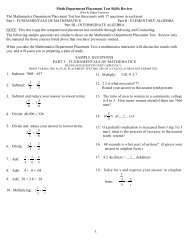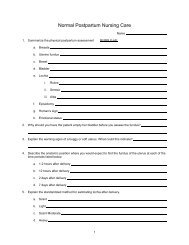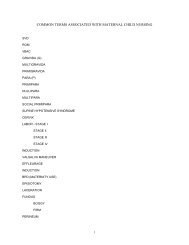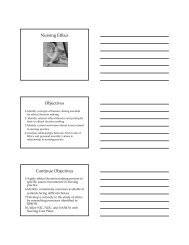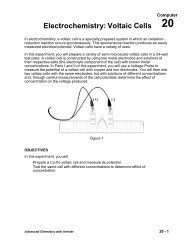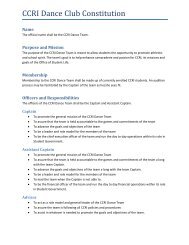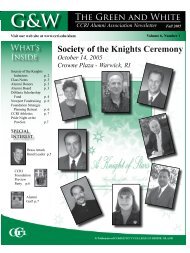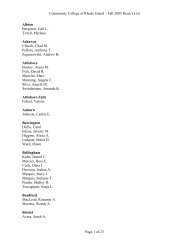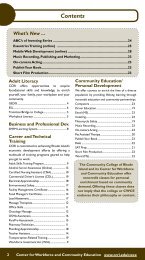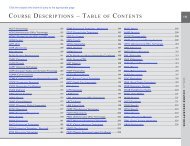Course Descriptions - Community College of Rhode Island
Course Descriptions - Community College of Rhode Island
Course Descriptions - Community College of Rhode Island
Create successful ePaper yourself
Turn your PDF publications into a flip-book with our unique Google optimized e-Paper software.
course descriptions<br />
visual, perceptual and motor challenges;<br />
language delay and hyperactivity and<br />
become familiar with diagnostic tests and<br />
the appropriate remediation techniques<br />
most <strong>of</strong>ten prescribed. The Individuals with<br />
Disabilities Education Act, along with current<br />
changes in research and social policy,<br />
frame discussions around eligibility for<br />
special services, the referral process and<br />
parental rights. (Completion <strong>of</strong> HMNS 2070<br />
strongly recommended.) Note: Grade <strong>of</strong> “C” or<br />
better is required for Human Services program<br />
students. Lecture: 3 hours<br />
HMNS 2180 - Significant Developmental<br />
Disabilities - 3 Credits<br />
The course provides a specialized understanding<br />
<strong>of</strong> individuals with significant<br />
developmental disabilities that includes a<br />
focus on multi-sensory impairment, severe<br />
mental retardation and pr<strong>of</strong>ound multiple<br />
disability. Students will learn strategies<br />
through hands-on activities for developing<br />
appropriate intervention and remedial<br />
skills. Use <strong>of</strong> technology, supportive equipment<br />
and environmental modifications<br />
are included. (Completion <strong>of</strong> HMNS 2070<br />
recommended.) Note: Grade <strong>of</strong> “C” or better<br />
is required for Human Services program students.<br />
Lecture: 3 hours<br />
HMNS 2190 - Infant/Toddler Care:<br />
Methods and Materials - 3 Credits<br />
This course is designed to assist in the<br />
planning <strong>of</strong> curriculum and care for infants<br />
and toddlers in home and center-based<br />
settings. Students develop skills for planning,<br />
selecting materials and designing the<br />
physical and social environments related<br />
to the promotion <strong>of</strong> infant and toddler<br />
development. (Completion <strong>of</strong> HMNS 2100<br />
recommended.) Note: Grade <strong>of</strong> “C” or better<br />
is required for Human Services program students.<br />
Lecture: 3 hours<br />
HMNS 2200 - Assessment Interviewing<br />
for Treatment Planning - 3 Credits<br />
This course provides an in-depth study <strong>of</strong><br />
the interviewing process, including methods<br />
for creating client safety and rapport<br />
and, most importantly, how to obtain and<br />
assess client information. Data collection<br />
and client assessment are the initial steps<br />
in the social service process, therefore, this<br />
is the first course in the social work, mental<br />
health, gerontology and substance abuse<br />
concentrations for teaching appropriate<br />
intervention skills. Students are taught how<br />
to use the interviewing process to initiate<br />
helping strategies for use in a variety <strong>of</strong><br />
mental health and social service settings.<br />
This course is a prerequisite for HMNS 1200.<br />
Note: Grade <strong>of</strong> “C” or better is required for<br />
Human Services program students. Lecture: 3<br />
hours<br />
HMNS 2210 - Family Intervention<br />
Skills - 3 Credits<br />
This course provides insight into the family<br />
in contemporary society with focus on<br />
the impact and handling <strong>of</strong> pain, trauma and<br />
difficulty. It <strong>of</strong>fers a theoretical background<br />
for understanding family development and<br />
examines trauma within the framework<br />
<strong>of</strong> family theory. Students learn how to<br />
identify the ways in which trauma impacts<br />
the family and how those traumas may be<br />
prevented and treated. The critical premise<br />
upon which this course is based is that<br />
families work as systems and that trauma<br />
does not occur as an isolated event. (Recommended<br />
prerequisites: PSYC 2010, HMNS<br />
1010, 2130 or permission <strong>of</strong> instructor). Note:<br />
Grade <strong>of</strong> “C” or better is required for Human<br />
Services program students. Lecture: 3 hours<br />
HMNS 2220 - Social Work Program and<br />
Policy Analysis - 3 Credits<br />
This course critically analyzes the values,<br />
theories, history, economics and politics<br />
associated with the development, implementation<br />
and evaluation <strong>of</strong> social policies<br />
and programs. Special attention is given<br />
to policies in the areas <strong>of</strong> poverty, education,<br />
health, race and sex. In addition to<br />
understanding the forces and processes<br />
that establish or change social policies,<br />
emphasis is placed on the systematic analysis<br />
<strong>of</strong> both existing and proposed social<br />
policy. Students will review current trends<br />
in national social policies and their effect<br />
on state/federal programs with particular<br />
attention to oppressed populations. This<br />
course places heavy emphasis on critical<br />
analysis. Students will learn to build on<br />
their skills in analyzing and critiquing various<br />
social policies. (Prerequisite: SOCS 1010,<br />
HMNS 1010, 1200, 2110, 2200) Note: Grade<br />
<strong>of</strong> “C” or better is required for Human Services<br />
program students. Lecture: 3 hours<br />
HMNS 2230 - Individuals, Families and<br />
Small Groups - 3 Credits<br />
This course examines how biological,<br />
psychological, social and cultural influences<br />
affect the behavior <strong>of</strong> individuals and<br />
families. Emphasis is placed on how human<br />
behavior is affected by social context and<br />
the forces <strong>of</strong> oppression as well as the<br />
impact <strong>of</strong> oppression on women, lesbians<br />
and gay men, persons with physical disabilities<br />
and the aged. Skills required to work<br />
with these populations, using an ecological/<br />
generalist person in environment approach,<br />
are discussed. (Recommended prerequisites:<br />
HMNS 1010, 1200, 2110, PSYC 2020, 2030<br />
and BIOL 1010 recommended). Note: Grade<br />
<strong>of</strong> “C” or better is required for Human Services<br />
program students. Lecture: 3 hours<br />
HMNS 2240 - Social Research<br />
Methods - 3 Credits<br />
This course provides students with instruction<br />
in the concepts and methods used in<br />
conducting social work research. By creating<br />
a foundation for empirically grounded<br />
practice, the course builds skills that will<br />
enable students to fill the role <strong>of</strong> social<br />
work practitioner/researcher. This course<br />
covers practice-based problems <strong>of</strong> formu-<br />
Prerequisite: Successful completion <strong>of</strong> course required before registering. Corequisite: <strong>Course</strong> must be taken prior to or at the same time.<br />
human services<br />
lation, research design, sampling, measurement,<br />
data collection, ethical issues and<br />
their application to social work settings.<br />
Particular attention is given to the application<br />
<strong>of</strong> course material for developing skills<br />
to evaluate one’s own social work practice,<br />
social agency programs and the research<br />
<strong>of</strong> others. (Prerequisite: SOCS 1010, HMNS<br />
1010, 1200, 2110) Note: Grade <strong>of</strong> “C” or better<br />
is required for Human Services program<br />
students. Lecture: 3 hours<br />
HMNS 2250 - Social Systems,<br />
Institutions and Organizations -<br />
3 Credits<br />
This course is designed to <strong>of</strong>fer students<br />
a sound theoretical base for social work<br />
intervention at both the micro and macro<br />
levels <strong>of</strong> social organization. The relationship<br />
between “private troubles” and “public<br />
issues” is stressed using social science<br />
theory in conjunction with social work values<br />
and concerns. Students also will be provided<br />
an opportunity to learn the system<br />
framework as a means <strong>of</strong> analyzing human<br />
behavior. Focus is on how the experience<br />
<strong>of</strong> class, political structure, race, ethnicity,<br />
community and organizations influence<br />
human behavior and are influenced by the<br />
needs and demands <strong>of</strong> people in the society.<br />
As a foundation course for the study<br />
<strong>of</strong> social work practice with large groups<br />
and communities within a generalist framework,<br />
this course focuses on institutional<br />
inequality and oppression. The implications<br />
<strong>of</strong> structural inequality for human behavior<br />
are addressed especially as they impact<br />
various racial, ethnic and minority groups<br />
who are likely to be consumers <strong>of</strong> social<br />
services. The role <strong>of</strong> organizations both in<br />
the lives <strong>of</strong> recipients as well as social service<br />
workers are analyzed to gain a better<br />
understanding <strong>of</strong> human behavior as it is<br />
influenced by and reflects the larger social<br />
structures in which it takes place. In sum,<br />
we will look at the dynamic relationship<br />
between the individual society and society<br />
in the individual and underscore the per-<br />
179



